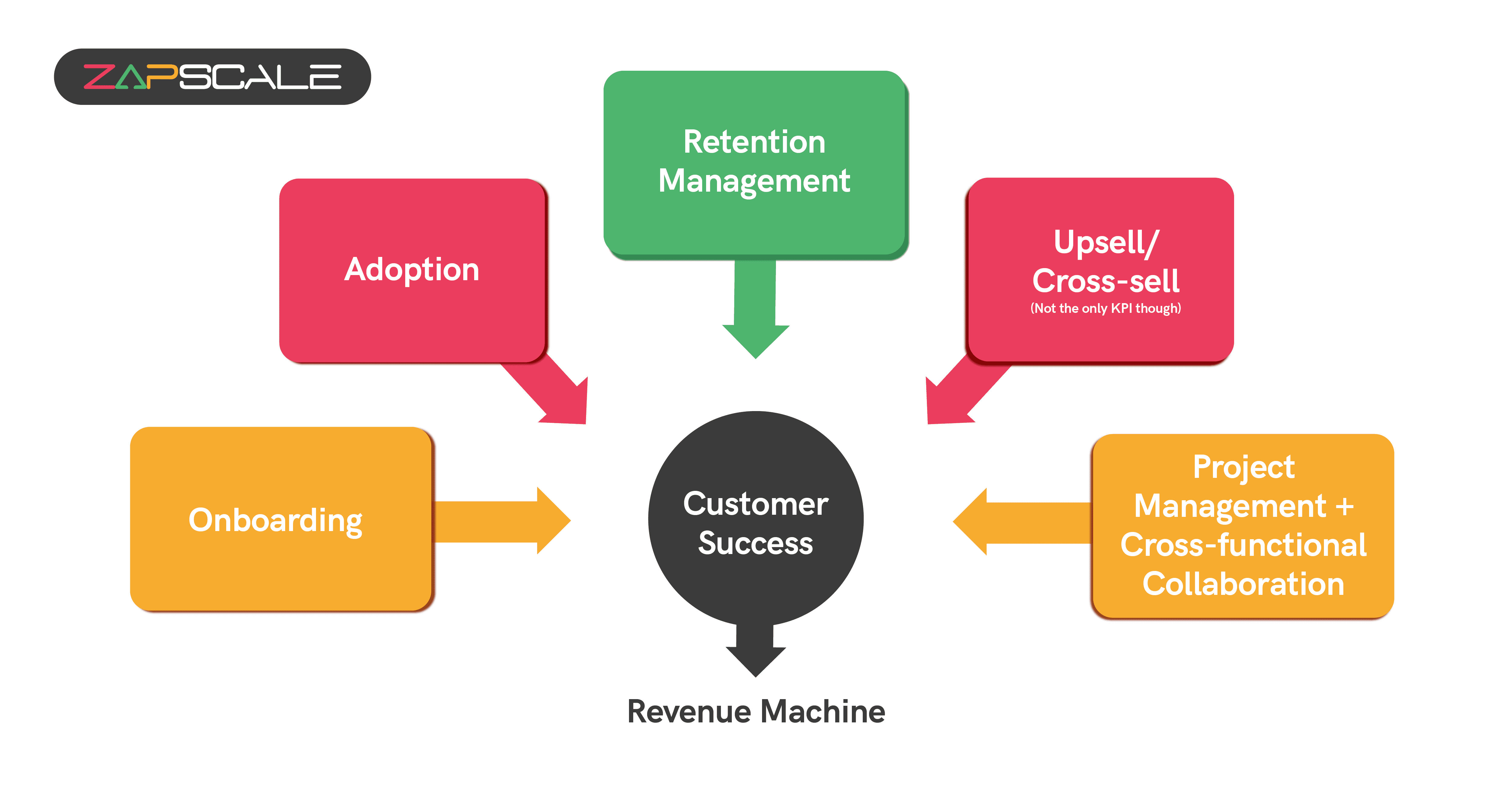CATEGORY > Customer Success Management
Why You Need a Customer Success Manager? The unsung hero of SaaS

Introduction
When I generally get my LinkedIn inbox deluged with queries from freshers and experienced professionals enquiring what a customer success manager's role is? Is it Customer Support? Is it Account Management? Is it Sales? Is it Strategy? Is it Project Management?
Some get outright hilarious when I am asked if the role means managing the company’s CRM tool, I wonder why we are not talking about Customer Success as a booming career option in present times. Why the ambiguity? It would surprise you that this ambiguity is not only among people seeking employment but from the employers’ side as well.
Let me first try to establish how an employer should look at CS as a vertical, that would automatically answer who can fit in or who can make a career pivot in accordance with the vertical’s/role’s demands, and voila, the employee side is sorted too.
How an Employer/Organisation should look at Customer Success?

Why do SaaS organizations need Customer Success?
So, what can CS do for you – first ask yourself, do you need CS? Any and every industry needs CS, the working dynamics will differ, the value system won’t and what’s the value system?
- A CS vertical is needed to retain your existing customer pool and ensure there are several moments of customer delight and build a solid business relationships so that churn is marginalized. CS will drive the entire retention strategy, ensuring customers stay and remain happy.
- A CS vertical is also needed to onboard the aggressive influx of newly acquired customers, A CS vertical will be the SPOC during the entire Kick Off, Customer Onboarding, Implementation, Delivery, UAT, and Go-Live phases. Post Go-Live CS will be the only vertical measuring this customer’s degree of success, in simplest words, are they achieving RoI and are they happy with your product/service?
- A CS vertical will not be your customer support team, neither will they do incident management. They definitely will advocate for a resolution in adherence to the TATs and SLAs, but they will not provide 24x7 support. No matter how early stage you are, the moment your CSM is a part of the support@xyz.com mailbox, your CX will go into a downward spiral because you are depriving your CSM of the strategic role he/she is supposed to play and simply overburdening him/her with multiple non-CS works, to start with, dumping his/her mailbox with incident reporting.
- A CSM’s primary objective is not to upsell. Yes, upselling or cross-selling can be a huge revenue stream, but it cannot be the only thing you put on a CSM’s head and expect it to be achieved above the other important aspects.
Imagine, you went to an Italian restaurant and ordered a Neapolitan Pizza. When the order came, you received a pizza that was not at all Neapolitan but tasted good. You call the waiter and complain.
The waiter apologizes and accepts the moment of truth that they are newly opened, their chef is new too, they are simply learning each day and agree to give you a rebate on the bill. You appreciate the honesty and as it tasted good, it satiated your hunger, you pay in full.
Next time you take others in the hope that they would have improved but you get the same treatment. This time the waiter comes and says this is the “best” they can do and it is their “signature” style and it is top selling. He also tries to push his other items on the menu.
What do you think? Will the sale happen? Will the customer be happy? That is a direct churn red flag. The customer will simply leave ensuring he never comes back. If you, the owner of this restaurant, decide to sack the waiter for not being able to fulfill his “upsell” targets, imagine how badly you understand your business, your workforce, and above all, your customers.
You do not understand that the steady ARR comes from customer retention. If you retain one, the word spreads and others come in. If you keep on sending discount ads and still, your product fails, you will lose existing customers and it will be like holding sand in your fist, you grab more, the more it slips out.
You push Sales to bring in more new customers, in a few days, they become your existing customers and like the previous ones, they leave. You are in the vicious churn cycle. Cyclic churn can be fatal to your organization. The CSM's neck should not be on the line for this, it should be the strategy and product teams you should be sending them back to their drawing boards.
How an Employee/Job Seeker should look at Customer Success
If you read till this point and you are a CSM or working in the CS function or wish to become a CSM (fresher) or wish to pivot to a CS role (experienced professional), then it must be clear to you that what an ideal CS organization should look like and what your employer should expect from the role, from you.
If that resonates with your career pursuits, then let me put forth some of the skills that you need to have to function as a successful CSM.
Essential Customer Success Manager Skills
The first and most important aspect of a CS role is its attitude to function as a Consultant. A proactive CSM will have to be multifaceted, as under:
- A CSM is a Product Consultant (who better knows what the roadmap needs?)
- A CSM is definitely a Strategy Consultant (do I even need to elucidate this, it’s a given - success comes with good strategy, understand your organizational strategy, understand your client’s goals, and work towards achieving synergy)
- A CSM is a Sales Consultant BUT is NOT to be treated as a sales/BD individual with sales/BD KPIs (Upsell and cross-sell are only a fraction of the CS KPIs, in some roles they might not even be present)
- A CSM is most certainly a Marketing Consultant (customer’s marketing journeys are devised by marketing-related products and your organisation’s brand building through happy customers is strategised by CSMs)
- A CSM is a Business Analyst (data into infographics on every QBR, MBR, EBR )
- A CSM does every bit of Market Research to give a competitive landscape to the clientele. You have to understand the business in the best possible way.
- A CSM is a Project Manager (From Kick Off to Delivery and post-live the entire lifespan of the customer is governed by a CSM)
- A CSM should have a sound understanding of Pricing Strategies
- Last, but definitely the most important, a CSM should be a customer advocate. Your job is to be hated by everyone in your organization but loved by all the clients you handle. You should be on top of things and bring in a tempest each time things turn sour for your client. You should knock product to the leadership to ensure your customers are happy, all customers are deriving value out of the whole engagement.
Conclusion
One has to remember that although not in an ideal setup, in reality, a CSM is responsible for nothing and accountable for everything. It is a high-risk job (your org has your neck if they churn, and your client has your neck if they don't get the desired outcome).
These skills make you a holistic business professional. You understand everything about a business. It is extremely challenging with a constant tussling with the product teams, organizational myopia about how CS should work, and the ever-demanding clients who are always seeking another redundant feature upgrade, but if you manage to balance, it is probably the most important role to play in any organization.
ABOUT THE AUTHOR

Ankit Acharya
Ankit is a seasoned Customer Success and Project Management professional with 8+ years of experience in IT, SaaS, and Product Organisations, having worked with Fortune 500 companies too. He is presently designated as a Sr Manager - Customer Success and Strategic Projects, working with a SaaS organisation, building anti-counterfeiting products for consumer industries.
Popular from Customer Success Management
Quality Content,
Straight To Your Inbox!
Subscribe for the latest blogs, podcasts, webinars, and events!

Write a Blog
If you have experience in CS and
a flair for writing, we’d love to
feature you.
Write to us on
hello@zapscale.com




